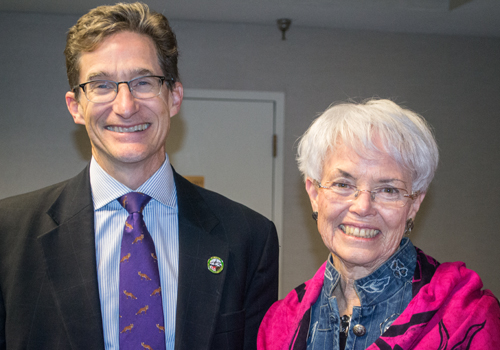ALEI Conference Explores Legal, Agricultural Topics
Maryland Agriculture Secretary Joseph Bartenfelder and Environment Secretary Ben Grumbles addressed the 2015 Agriculture and Environmental Law Conference, each discussing some of the most pressing issues concerning farmers and conservationists.
In addition to outlining the state of agriculture in Maryland, Bartenfelder briefed attendees on the Phosphorus Management Tool (PMT). Grumbles spoke about opportunities envisioned through nutrient credit trading.
Held by the University of Maryland Agriculture Law Education Initiative (ALEI), an endeavor of University of Maryland: MPowering the State, the conference drew more than 100 attorneys, farmers, educators, and others to Annapolis on Nov. 20.
Lawmakers took note of the conference through their attendance or by viewing sessions remotely. For example, Maryland Sen. Bill Ferguson of District 46, representing Baltimore, viewed on the social media application, Periscope. State Sen. Adelaide C. Eckardt of District 37, representing Caroline, Dorchester, Talbot, and Wicomico counties, attended in person.

Md. Environment Secretary Ben Grumbles with Md. Sen. Adelaide C. Eckardt
Academic leaders included Donald B. Tobin, JD, dean of the University of Maryland Francis King Carey School of Law at the University of Maryland, Baltimore (UMB) and Craig Beyrouty, PhD, MS, dean of the College of Agriculture & Natural Resources (AGNR) at the University of Maryland, College Park (UMCP). The state’s founding and flagship universities, respectively, collaborate to carry out the programs of MPowering the State.
A common theme of speakers throughout the daylong conference was how to best balance production of crops, livestock, and poultry with the need to protect the Chesapeake Bay and its tributaries from excessive nitrogen and phosphorus.
As agriculture secretary, Bartenfelder gave an inside perspective to the work last spring to develop a PMT that would be considered acceptable to a wide group of stakeholders as well as to Gov. Larry Hogan, who differed with his predecessor’s approach.
Bartenfelder described the resulting regulations as “the best proposal and the most progressive proposal, not only for the agriculture community but for the environmental community in this state.”
“My feelings were reinforced,” he said, when the U.S. Environmental Protection Agency’s regional administrator relayed kudos to the state during a conversation with Bartenfelder. “Hopefully, what we did can become a model for our surrounding states. And if it doesn’t become a model, hopefully at least some of those states will start to do something.”
Bartenfelder expressed optimism about the implementation process, noting that the first meeting of the PMT advisory committee was held the day before the conference.
Subjects at the conference ranged from aquaculture to anaerobic digestion. UM Regional Extension Specialist Donald Webster spoke on acquaculture leasing, and Anthony Gorski, JD, a partner with Rich & Henderson, P.C. of Annapolis and Easton, Md., addressed legal and agricultural “hot topics.”
A panel of three experts covered the subject of anaerobic digesters on the farm from policy, legal, and science perspectives. (view a video below)
The panelists were Stephanie Lansing, PhD, assistant professor in the agriculture college’s Department of Environmental Science and Technology; Gary Kelman, chief, Animal Feeding Operation Division, Maryland Department of the Environment (MDE); and Bill Paul, chief, Combustion and Metallurgical Division, Air & Radiation Management Administration, MDE.
Among those bringing a farmer’s viewpoint to the conference was John Swaine III, chairman of the Talbot County Soil Conservation Board of Supervisors, discussing farm conservation practices.
Maryland Carey Law associate professor Michael Pappas, JD, MA, commented in his remarks introducing each of the state secretaries that conference attendees could get no better insights than by hearing directly from the agencies’ leaders.
The MDE secretary outlined benefits that might be derived by adoption of nutrient credit trading. “I’m a champion of trading done right,” Grumbles said, going on to explore 10 reasons to pursue nutrient credits.
“The status quo is fatal,” Grumbles declared. “At the federal level and in states around the country, there’s enthusiasm about using new tools to make progress.”
The Maryland General Assembly established the ALEI in 2011 to provide Maryland farmers with the information they need to prosper while complying with the complex network of laws and policies protecting the integrity of the state’s food system and environment.
ALEI is a collaboration under University of Maryland: MPowering the State, which brings together two universities of distinction to form a new collaborative partnership. Harnessing the resources of each, UMB and UMCP will focus their collective expertise on critical statewide issues of public health, biomedical informatics, and bioengineering. This collaboration will drive an even greater impact on the state, its economy, the job market, and the next generation of innovators. Through the University of Maryland Extension - the statewide, non-formal agriculture education system - the collaboration partners with the School of Agricultural and Natural Sciences at the University of Maryland, Eastern Shore.



